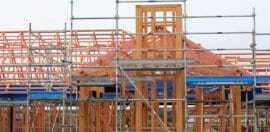Our community is only as strong as those who are struggling the most

17 March 2020 at 8:28 am
In times like these we must remember the vulnerable, especially those who are homeless, writes Doug Taylor, director of mission, communities and social impact at Uniting.
COVID-19, bushfires, drought and severe storms – when a changing climate and a new virus collide, we see where our priorities need to change.
Our black summer has been quickly followed by a pandemic – two events unprecedented in recent times and whose effects will be felt for years to come.
While much of the talk has been about the economic downturn and toilet paper wars, the most vulnerable in our society are being hit from multiple sides and with nothing near the support they need.
We know our elders are more at risk from COVID-19, as are other vulnerable and disadvantaged groups such as those who are already facing complex health issues.
Imagine the case of a person in their sixties who is unwell, homeless and facing 45-degree temperatures one week, choking smoke the next and then, nowhere to safely shelter as COVID-19 spreads. How are you meant to shelter or self-isolate without a safe and secure home?
“How are you meant to shelter or self-isolate without a safe and secure home?”
In New South Wales there is a shortfall of 136,000 social housing dwellings and almost 53,000 people face a wait of up to 10 years or more for a placement.
Over the last decade the number of older homeless people (aged 55 and over) increased by 49 per cent. Yet, you must be aged over 80 to qualify for priority placement. Older women are the fastest growing group of homeless, forced to couch surf or live in cars, yet there is no homeless service that specialises in older people.
These are problems in themselves, but when you add the extra challenges we currently face, you see we urgently need extra funding for social housing.
We are a rich state in a rich country. The last NSW budget boasted “record” spending on infrastructure, schools, hospitals and transport – and a surplus.
We applaud the premier’s priority of breaking the cycle of disadvantage, especially in the areas of homelessness and protecting vulnerable children.
So, we ask that the government increases measures that will help vulnerable people and reduce growing inequality. This means a focus on addressing their unique needs in some of the recent and immediate calamities but also long-term commitments, as the challenges will only increase.
We believe 5,000 additional dwellings should be funded in the next state budget as a minimum, as part of a long-term plan to increase social housing stock. This could be funded with a proportion of revenue from stamp duty.
Seniors who are facing homelessness also need holistic case management, to ensure they don’t fall through the cracks. The NSW government needs to step up and fund a state-wide trial of a seniors housing and information service.
The government needs to continue the shift towards early support for vulnerable children and families to prevent issues escalating. More government investment in this approach will keep families together and reduce the number of children entering state care. Early intervention improves people’s life outcomes and saves long-term support costs.
Every dollar we spend on vulnerable and disadvantaged people now will save many more dollars for our health, justice and education sectors down the track.
We must remember, especially in difficult times such as these, that our community is only as strong as those who are struggling the most. Government spending not only needs to be directed at the emergencies today but those that are to come.







